国际学校面试问题
国际高中面试常见问题
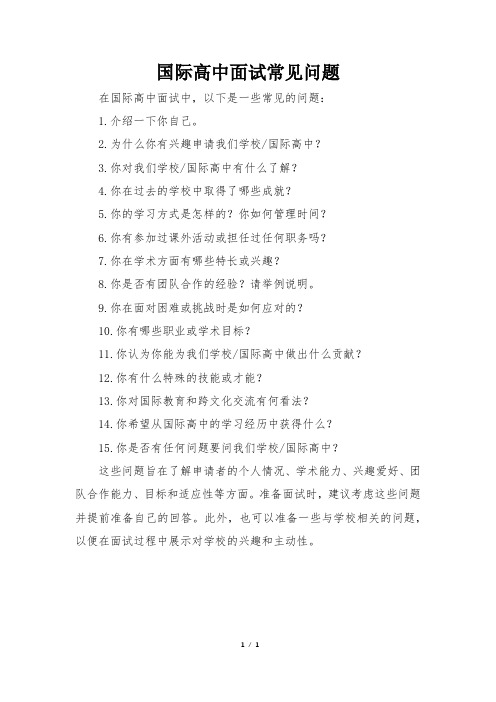
国际高中面试常见问题
在国际高中面试中,以下是一些常见的问题:
1.介绍一下你自己。
2.为什么你有兴趣申请我们学校/国际高中?
3.你对我们学校/国际高中有什么了解?
4.你在过去的学校中取得了哪些成就?
5.你的学习方式是怎样的?你如何管理时间?
6.你有参加过课外活动或担任过任何职务吗?
7.你在学术方面有哪些特长或兴趣?
8.你是否有团队合作的经验?请举例说明。
9.你在面对困难或挑战时是如何应对的?
10.你有哪些职业或学术目标?
11.你认为你能为我们学校/国际高中做出什么贡献?
12.你有什么特殊的技能或才能?
13.你对国际教育和跨文化交流有何看法?
14.你希望从国际高中的学习经历中获得什么?
15.你是否有任何问题要问我们学校/国际高中?
这些问题旨在了解申请者的个人情况、学术能力、兴趣爱好、团队合作能力、目标和适应性等方面。
准备面试时,建议考虑这些问题并提前准备自己的回答。
此外,也可以准备一些与学校相关的问题,以便在面试过程中展示对学校的兴趣和主动性。
1/ 1。
国际学校面试参考答案
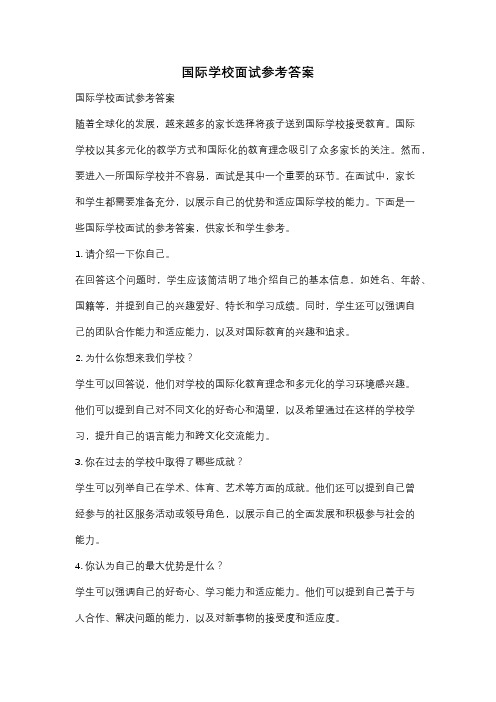
国际学校面试参考答案国际学校面试参考答案随着全球化的发展,越来越多的家长选择将孩子送到国际学校接受教育。
国际学校以其多元化的教学方式和国际化的教育理念吸引了众多家长的关注。
然而,要进入一所国际学校并不容易,面试是其中一个重要的环节。
在面试中,家长和学生都需要准备充分,以展示自己的优势和适应国际学校的能力。
下面是一些国际学校面试的参考答案,供家长和学生参考。
1. 请介绍一下你自己。
在回答这个问题时,学生应该简洁明了地介绍自己的基本信息,如姓名、年龄、国籍等,并提到自己的兴趣爱好、特长和学习成绩。
同时,学生还可以强调自己的团队合作能力和适应能力,以及对国际教育的兴趣和追求。
2. 为什么你想来我们学校?学生可以回答说,他们对学校的国际化教育理念和多元化的学习环境感兴趣。
他们可以提到自己对不同文化的好奇心和渴望,以及希望通过在这样的学校学习,提升自己的语言能力和跨文化交流能力。
3. 你在过去的学校中取得了哪些成就?学生可以列举自己在学术、体育、艺术等方面的成就。
他们还可以提到自己曾经参与的社区服务活动或领导角色,以展示自己的全面发展和积极参与社会的能力。
4. 你认为自己的最大优势是什么?学生可以强调自己的好奇心、学习能力和适应能力。
他们可以提到自己善于与人合作、解决问题的能力,以及对新事物的接受度和适应度。
5. 你在学校中遇到过困难吗?你是如何解决的?学生可以回答说,他们在学校中遇到过困难,比如学习上的困难或与同学之间的矛盾。
他们可以提到自己是如何主动寻求帮助、制定解决方案,并最终克服困难的。
6. 你对国际学校的期望是什么?学生可以回答说,他们希望在国际学校中能够接触到多元文化,拓宽自己的视野。
他们还可以提到希望学习到更广泛的知识和技能,以及培养自己的领导力和创新能力。
7. 你认为自己在国际学校中会面临哪些挑战?学生可以回答说,他们可能会面临语言障碍、适应新环境的困难等。
然而,他们可以强调自己的积极态度和解决问题的能力,以及对新挑战的兴趣和渴望。
国际学校面试常见问题
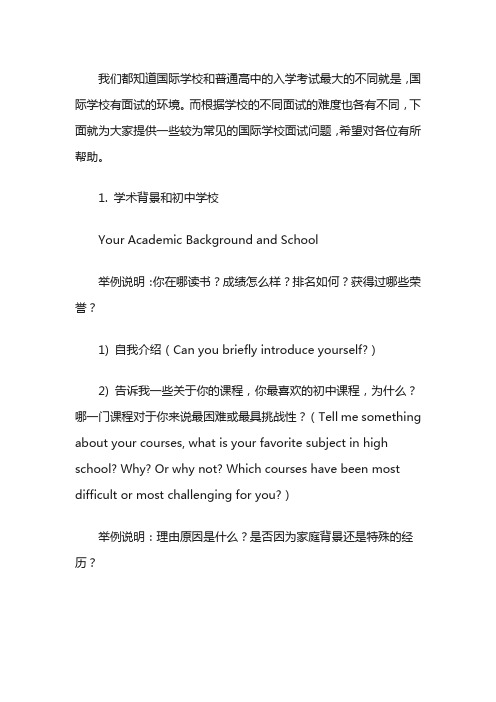
我们都知道国际学校和普通高中的入学考试最大的不同就是,国际学校有面试的环境。
而根据学校的不同面试的难度也各有不同,下面就为大家提供一些较为常见的国际学校面试问题,希望对各位有所帮助。
1. 学术背景和初中学校Your Academic Background and School举例说明:你在哪读书?成绩怎么样?排名如何?获得过哪些荣誉?1) 自我介绍(Can you briefly introduce yourself?)2) 告诉我一些关于你的课程,你最喜欢的初中课程,为什么?哪一门课程对于你来说最困难或最具挑战性?(Tell me something about your courses, what is your favorite subject in high school? Why? Or why not? Which courses have been most difficult or most challenging for you?)举例说明:理由原因是什么?是否因为家庭背景还是特殊的经历?3) 你喜欢你的初中学校吗?你是怎么描述你的学校的?(Do you like your high school? How would you describe your school?)描述一种感觉!对你的生活有哪些影响?4) 你最喜欢哪一位老师,为什么?(Who is your favorite teacher? Why?)喜欢科目,还是喜欢老师的教学方法吸引人,亦或是喜欢老师待人接物的方式?5) 你取得的最大学术成就或经历过的最大失败是什么?(What is your greatest academic accomplishment or failure?)令人难忘的经历,原因是什么?失败不要紧,可以就事论事地说,重要的是学会了什么,此处可以用乔丹曾经说过的,You failed, failed and failed, that’s why you succeed.6) 如果你是校长/有机会做一件事,会如何改变学校?2.个人生活Personal Life1) 告诉我一些你自己的生活,包括你的家庭背景和你在哪里长大?(Tell me about yourself, including your family background and where you grew up?)2) 你最喜欢哪本书,最喜欢哪位作者,最欣赏哪一步电影或电视剧?为什么?(What is your favorite book, author, movie or TV? Why?)3) 你经常阅读哪一份杂志和报纸?(What magazines or newspapers do you read regularly?)4)哪一个人对你的生活影响最大?(What person has most influenced you in your life?)3. 关于课外活动Your Extracurricular Activities1) 哪项课外活动中你做的贡献最大?(What has been your greatest contribution to an extracurricular activity?)2) 你有什么爱好和特别感兴趣的事情?(Do you have any hobbies or special interests?)3) 你如何描述自己的家乡?(How would you describe your hometown?)4) 你是否出过国?是否有外国朋友?(Have you ever been abroad?)4、关于高中的问题Question About High School1)哪一项标准对你选择高中最重要?(What are your most important criteria in looking at High School?)2)你对于我们学校最感兴趣的是什么?为什么想来这所学校念书?(What is of the most interest to you about our school? Why do you want to attend this particular High School?)一定要仔细研究下学校的主页,了解现在学校的一些活动和信息,对于大标题,英文缩写等要留意。
民心国际学校面试题目(3篇)
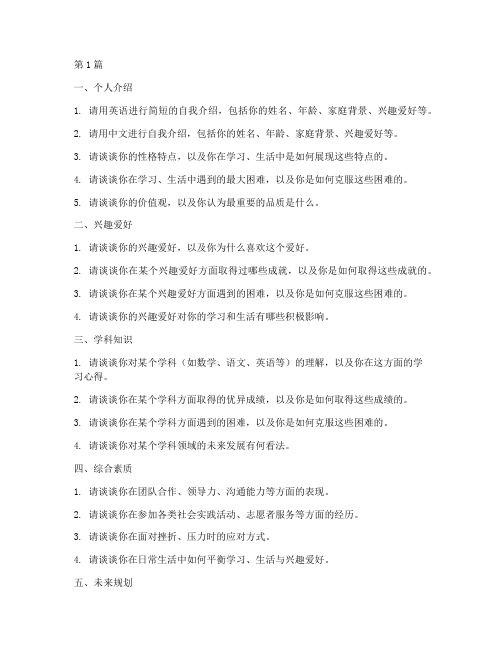
第1篇一、个人介绍1. 请用英语进行简短的自我介绍,包括你的姓名、年龄、家庭背景、兴趣爱好等。
2. 请用中文进行自我介绍,包括你的姓名、年龄、家庭背景、兴趣爱好等。
3. 请谈谈你的性格特点,以及你在学习、生活中是如何展现这些特点的。
4. 请谈谈你在学习、生活中遇到的最大困难,以及你是如何克服这些困难的。
5. 请谈谈你的价值观,以及你认为最重要的品质是什么。
二、兴趣爱好1. 请谈谈你的兴趣爱好,以及你为什么喜欢这个爱好。
2. 请谈谈你在某个兴趣爱好方面取得过哪些成就,以及你是如何取得这些成就的。
3. 请谈谈你在某个兴趣爱好方面遇到的困难,以及你是如何克服这些困难的。
4. 请谈谈你的兴趣爱好对你的学习和生活有哪些积极影响。
三、学科知识1. 请谈谈你对某个学科(如数学、语文、英语等)的理解,以及你在这方面的学习心得。
2. 请谈谈你在某个学科方面取得的优异成绩,以及你是如何取得这些成绩的。
3. 请谈谈你在某个学科方面遇到的困难,以及你是如何克服这些困难的。
4. 请谈谈你对某个学科领域的未来发展有何看法。
四、综合素质1. 请谈谈你在团队合作、领导力、沟通能力等方面的表现。
2. 请谈谈你在参加各类社会实践活动、志愿者服务等方面的经历。
3. 请谈谈你在面对挫折、压力时的应对方式。
4. 请谈谈你在日常生活中如何平衡学习、生活与兴趣爱好。
五、未来规划1. 请谈谈你的未来职业规划,以及你为什么选择这个职业。
2. 请谈谈你为实现这个职业规划所做出的努力,以及你将如何继续努力。
3. 请谈谈你对所在行业的了解,以及你对这个行业的看法。
4. 请谈谈你如何在这个行业中获得成功,以及你将如何为社会做出贡献。
六、家校合作1. 请谈谈你的家庭教育环境,以及家长对你的教育和培养。
2. 请谈谈你在学校生活中遇到的问题,以及家长是如何帮助你解决这些问题的。
3. 请谈谈你与老师、同学之间的互动,以及你如何与他们在学习和生活中建立良好关系。
国际学校面试问题.doc

国际学校面试问题说说我面试的时候遇到的一些奇葩问题吧。
有个国际学校的中文课程主任面试的时候问了我如下问题:1)听说你现在在印尼工作,那你知道在印尼去世的郁达夫的作品,和中国古代的山水画作品有什么关系?——我答:不知道。
2)印尼本地的歌谣,和中国的《诗经》有什么相似的地方?——我答:不了解。
3)听说你是学语言的,那么,请你说一下四大名著的英文版本,有什么语言学的特点?——我答:我不明白您的问题。
4)印尼这个东亚国家,是不是属于印度文化圈?——我答:印尼是东南亚国家,不是东亚国家。
北京某个蛮新的国际学校,据说承诺给本地老师和外国老师同等薪水待遇。
他们破例给了我一个skype面试的机会,我在内心还颇为感动。
面试官是小学校长和他们的中文课程总监,据说两人都是在国外出生的华人,有二三十年的国际学校教学经验,中文课程主任还是国内非常知名的连锁国际学校的中文课程设计者和开创者,我在内心也是颇为"尊重"。
面试约的是下午三点半,不过她们到四点才联系我,我心想,人在屋檐下不得不低头,面吧。
结果,面试基本上持续了五分钟就结束了。
她们给我迟到的解释是她们开会来着,当然,我等是应该的,我也没什么抱怨,不过很显然,她们基本上没有怎么读过我的简历,所以面试基本上也就进行不下去。
她们其实说着很典型的海外华人口音的中文,其实我倒宁愿她们说英语,因为我总感觉,没有看过简历加上并不是太流利的中文,总是让我觉得她们的表达很吃力。
五分钟之间,好像也问了几个问题,不过基本上也就是无关痛痒的,比如:(1)你有没有国际学校的教学经验?——我很想说:当然,您看我简历就知道了。
我现在学校的名字是**international school.——不过我没有这么说,我说:有,我现在就职的就是一个国际学校。
我已经教了三年了。
(2)为什么你XX年毕业之后换了很多份工作,每次工作都是半年一年?——我在心里默默的念:nnd,老娘XX年才毕业,毕业到现在八年了,我就只在两个学校工作过,每次都是三年以上。
国际班面试题目(3篇)

第1篇一、面试题目1. 请简要介绍一下自己。
2. 为什么选择报考我们学校的国际班?3. 你认为与国内教育相比,国际教育有哪些优势?4. 你了解国际班所提供的课程体系吗?请谈谈你对这些课程的理解。
5. 你最喜欢的科目是什么?为什么?6. 你在初中阶段取得过哪些学术成就?请举例说明。
7. 你在课外有哪些兴趣爱好?请谈谈你是如何平衡学习和兴趣爱好的。
8. 你认为自己的性格特点有哪些?请举例说明。
9. 你如何看待团队合作?请谈谈你在团队合作中的角色和经验。
10. 你在初中阶段遇到过哪些困难?你是如何克服的?11. 你对未来的职业规划是什么?为什么?12. 你认为自己在哪些方面需要提高?请谈谈你的努力方向。
13. 你对我们学校的校园文化有何了解?请谈谈你对校园文化的看法。
14. 你如何看待国际交流与合作?请谈谈你的观点。
15. 请谈谈你对“国际化人才”的理解。
16. 你认为国际教育对个人成长有哪些影响?17. 请谈谈你对教育公平的看法。
18. 你在初中阶段有哪些难忘的经历?请谈谈这些经历对你的影响。
19. 你如何看待网络成瘾问题?请谈谈你的观点。
20. 你认为如何培养学生的创新精神和实践能力?二、解析1. 请简要介绍一下自己。
解析:这道题目旨在考察学生的表达能力、自信心和语言组织能力。
在回答时,学生应简洁明了地介绍自己的姓名、年龄、家庭背景、兴趣爱好等基本信息。
2. 为什么选择报考我们学校的国际班?解析:这道题目旨在了解学生对国际教育的认知和选择原因。
学生可以从学校的教育理念、课程设置、师资力量、国际化环境等方面进行阐述。
3. 你认为与国内教育相比,国际教育有哪些优势?解析:这道题目考察学生对国际教育的了解程度。
学生可以从培养学生的跨文化交际能力、独立思考能力、创新能力等方面进行回答。
4. 你了解国际班所提供的课程体系吗?请谈谈你对这些课程的理解。
解析:这道题目旨在考察学生对国际班课程体系的了解程度。
学生应简要介绍课程体系的特点、优势,并结合自身经历谈谈对课程的理解。
国际学校入学面试题

国际学校入学面试题在国际学校入学面试中的常见问题国际学校入学面试对于家长和学生来说可能是一个紧张且重要的过程。
为了帮助大家更好地准备这个面试,本文将介绍一些国际学校入学面试中常见的问题,并提供一些回答的参考。
这些问题主要涵盖了学生的学术能力、兴趣爱好、个人发展和学校适应能力等方面。
1. 你为什么想申请这所学校?回答时可以表达对学校的特色和教学理念的认同,以及对学校资源和师资的赞赏。
例如:“我对贵校的多元化课程设置和丰富的学术活动非常感兴趣,我相信这些能够提升我在各个领域的能力。
”2. 过去的学习经历中,你觉得最有趣或者有意义的是什么?这个问题旨在了解学生对于学习的态度和热情。
可以选择一个具体的项目或者课程,描述自己是如何从中获得启发和成长的。
3. 你的兴趣爱好是什么?有没有参加过相关的比赛或者活动?通过了解学生的兴趣爱好,学校可以判断学生在课余时间的发展情况以及是否具备团队合作和领导能力。
可以选择两到三个兴趣爱好进行介绍,并强调自己在该领域的表现和成就。
4. 你在学校有哪些荣誉或者获奖经历?这个问题旨在了解学生在学校中的表现和成绩。
可以列举一些曾经获得的荣誉或奖项,例如学校比赛的冠军或者学术竞赛中的优异成绩。
5. 你认为自己的优点是什么?在回答这个问题时,可以结合自己的学习成绩、个人特长和品德方面进行描述。
例如:“我认为我的优点是责任心强,且乐于助人。
在学校里,我总是尽力完成分内的任务,并且愿意帮助其他同学。
”6. 你对于学校社区有何贡献计划?学校注重学生对社区的服务和贡献,因此这个问题是非常重要的。
可以提出一些关于如何通过组织社区活动或者参与志愿服务来推动学校社区的发展和进步的想法。
7. 你遇到困难时是如何解决的?这个问题旨在了解学生的应变能力和解决问题的思维方式。
可以通过讲述一个具体的困难遭遇和解决方案来进行回答,强调自己的坚持和积极解决问题的态度。
8. 你还有其他需要补充的关于自己的优点或者特长吗?这是一个让学生有机会展示自己其他优点和特长的问题。
求职国际学校面试题
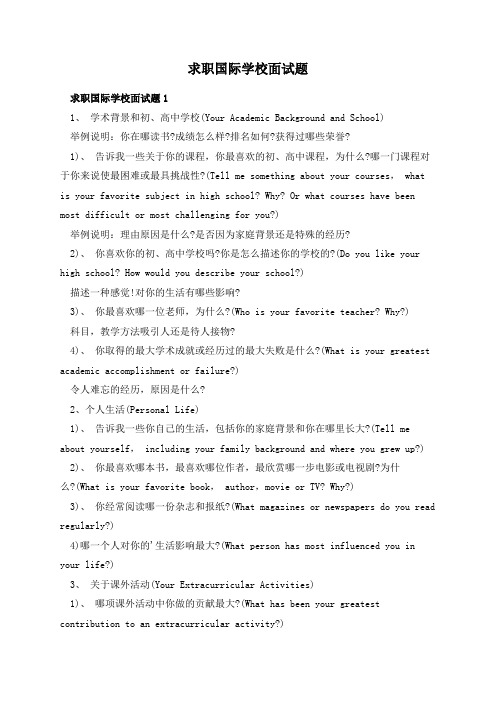
求职国际学校面试题求职国际学校面试题11、学术背景和初、高中学校(Your Academic Background and School)举例说明:你在哪读书?成绩怎么样?排名如何?获得过哪些荣誉?1)、告诉我一些关于你的课程,你最喜欢的初、高中课程,为什么?哪一门课程对于你来说使最困难或最具挑战性?(Tell me something about your courses, what is your favorite subject in high school? Why? Or what courses have been most difficult or most challenging for you?)举例说明:理由原因是什么?是否因为家庭背景还是特殊的经历?2)、你喜欢你的初、高中学校吗?你是怎么描述你的学校的?(Do you like your high school? How would you describe your school?)描述一种感觉!对你的生活有哪些影响?3)、你最喜欢哪一位老师,为什么?(Who is your favorite teacher? Why?)科目,教学方法吸引人还是待人接物?4)、你取得的最大学术成就或经历过的最大失败是什么?(What is your greatest academic accomplishment or failure?)令人难忘的经历,原因是什么?2、个人生活(Personal Life)1)、告诉我一些你自己的生活,包括你的家庭背景和你在哪里长大?(Tell me about yourself, including your family background and where you grew up?)2)、你最喜欢哪本书,最喜欢哪位作者,最欣赏哪一步电影或电视剧?为什么?(What is your favorite book, author,movie or TV? Why?)3)、你经常阅读哪一份杂志和报纸?(What magazines or newspapers do you read regularly?)4)哪一个人对你的'生活影响最大?(What person has most influenced you in your life?)3、关于课外活动(Your Extracurricular Activities)1)、哪项课外活动中你做的贡献最大?(What has been your greatest contribution to an extracurricular activity?)2)、你有什么爱好和特别感兴趣的事情?(Do you have any hobbies or special interests?)3)、你如何描述自己的家乡?(How would you describe your hometown?)4、关于高中的问题(Question About High School)1)、哪一项标准对你选择高中最重要?(What are your most important criteria in looking at High School?)2)、你对于我们学校最感兴趣的是什么?为什么想来这所学校念书?(What is of the most interest to you about our school? Why do you want to attend this particular High School?)3)、你在课余时间都喜欢做什么?(What do you like to do in your free/spare time?)4)、你对我们学校最关注的课程是什么?(What did you like most about our school’s Academy?)5)、你在大学里想学的专业是什么?(What do you think your major will be in college?)6)、你将来选择的事业目标是什么?(What are your future career goal?)7)、你还申请了哪所学校?(What other schools are you considering?)8)、我们为什么该录取你? (Why should we accept you?)该处你可等注意了,展示自己的优势,不要像大多数中国人那样内敛,该说就说。
- 1、下载文档前请自行甄别文档内容的完整性,平台不提供额外的编辑、内容补充、找答案等附加服务。
- 2、"仅部分预览"的文档,不可在线预览部分如存在完整性等问题,可反馈申请退款(可完整预览的文档不适用该条件!)。
- 3、如文档侵犯您的权益,请联系客服反馈,我们会尽快为您处理(人工客服工作时间:9:00-18:30)。
All about you:– Why do you want to teach at our school? Why should we hire you?– What has been your most positive teaching experience?– What has been your most negative teaching experience? What would you change?– What is your philosophy of education?– What have you recently done in education of an interesting or innovative nature?– What motivates you?– What professional books, blogs, or journals have you read to keep abreast of educational news and best practices?– How would your students describe you?– What is your greatest strength/weakness as a teacher?– What are 3 words that your students/admin/close friends would use to describe you?– Describe a typical lesson in your classroom. (Going through the step by step overview)– Describe a successful lesson and how you knew it went well.– Why did you want to be a teacher?– What is a difficult situation you faced and how did you deal with it?– What do you want to teach__________(grade level) students? What do you like about them?– How do you use technology in your classroom?– How do you use assessment in your classroom? Describe how you used the information you gained from an assessment in your instruction.– How do you address the needs of English language learners?– How do you integrate other subjects into your units?– How do you approach classroom discipline?– What is your favorite essential question (UBD model)?Parents– How do you communicate student progress to parents?– How do you normally communicate with parents?– How have you involved parents in the learning process?Students– How do you handle the different abilities of students in your class?– What techniques have you found useful in individualizing learning in your class?-Describe one or two techniques you use to motivate students. How do you motivate a student to learn a concept they do not do well in?– Describe a difficult student you had and how you handled it.– How do you handle a student who is a consistent behavioral problem in your class?– If you met your students 20 years from now, what would you want them to remember about you?School– Why do you want to teach at __________ (school)?– How have you contributed to the development of the total school program in your current position?– How do you structure your classroom to achieve maximum benefit from teacher/student contact?– What kind of extracurricular activities would you be interested in being part of?– What are the talents/expertise you can bring to your team?– Why are you leaving your current school?– What did you like the most about your current school?– What was the most difficult thing about your current school?– How would you implement the school’s core values into your classroom?– What are your thoughts on collaboration with other staff?Country/City Specific– Why do you want to live in __________ (country)?– Tell me what you already know about the country and culture.– What kinds of things do you like to do outside of school?– Do you have any concerns about moving to this country?The End of the Interview– Is there anything else you feel that you want me to know about you, that we haven’t had a chance to talk about?– Do you have any questions for us?Questions to ask during the interview:What are the nationalities of the student body? What is the percentage of each nationality?How many students are in the school and what are class sizes? How many current foreign teachers are working for them?Are students admitted with little or no English skills?What percentage of the teachers renews their contract for a third or fourth year?What expectations are there for teacher participation beyond the regular school day?What is the frequency of faculty meetings, committee meetings and other meetings teachers must attend on a weekly basis?How long is the school year? When are holidays/breaks? (you should be able to find this on the school we bsite, but if you can’t, then ask).Are teaching materials readily available? Technology? Internet? What are the classrooms like? Desks for every student? Do teachers use chalkboards or a projection system?How involved are parents and the PTO?Do teachers work together?Does the administration side with teachers or parents?Is the curriculum open or closed? Do teachers have freedom in the classroom when approaching the lessons?How much time do I get with my students?What is the dress code at the school for teachers and students? What support services are provided to students? Is the curriculum aligned with particular standards?I’m very interested in building my skills as a teacher. What staff development opportunities are offered?How is the reading program organized?What new programs or activities are being considered for the coming year?How would you describe the atmosphere and culture at your school? Why do people like to work at your school?Is there a yearly budget provided for continuing education/professional development?Person Questions:How safe is the area where you will be living and how safe is the city in general?What will housing be like?What is the level of health care in the country?How long will it take to get to school?What do teachers do weekends and after school?Does the teacher salary cover all living expenses?Are foreign employees welcomed?What is the social life like both at the school and local community? Is the mail system reliable? Can I easily send and receive packages? How easy is it to travel within and out of the country?Be Prepared for ToughInterview QuestionsCredentials, enthusiasm and a burning desire to teach overseas describes nearly 100% of recruiting-fair candidates. So, how do you set yourself above the bar with so many high caliber candidates competing for the same positions?A Director’s gut feeling about how you’ll fit into and adapt to their school and geographical location certainly plays a big part in the decision-making process. For some hardship locations, a “good fit” may be more important than actual years of teaching experience and advanced degrees. But when it comes to competing for the most desirable schools, your answers to some unexpected interview questions can easily make or break the deal:Tell me about yourself. What’s your greatest contribution to your last school? If I walked into your classroom, what would I see? How will your past or current Director describe you when I dial them up? How would your students describe you? Teach me something right now! What’s the last article or book you read on teaching? Which educational journals do you subscribe to? Tell me about a conflict you resolved.Answering tough interview questions is something you definitely don’t want to do impromptu. Of course, if you’re thrown a curve ball you have to swing at it, but anticipating and honing your answers to possible interview questions is obviously the best way to prepare for a successful interview. You just might be Teacher of the Year material but if you can’t convince the interviewer of that, all is for naught.10 things international schools look for when hiring new teachersPublished on 17th November, 2014 by Andrew Wigford. Published in ForCandidates / TIC NewsThere are many international schools considered to be amongst the mostprogressive and well-respected schools in the world. But don’t be daunted bythat. They need great teachers, and good schools will support their teachers tobecome part of their learning-focused ethos. So what do these schools lookfor when hiring new teachers? Here are the top 10 qualities that mostinternational schools look for in the teachers they hire:Enthusiastic teachers who love working with young peopleNothing compares with your passion for learning and teaching. So if you’reenthusiastic and committed to meeting the learning needs of each and everystudent, you’re half way there.Responsible teachers who do their researchFinding the right school is important, for both you and your employer. Showthat you have done your research, that you know the school, its focus, itsphilosophy. Demonstrate that you have thought seriously about the location,how you’ll respond to the move, and how you’ll cope with leaving home. Beprepared to explain why you want to move abroad.Teachers who are internationally mindedYou may be choosing to live and work in a location very different to your home country, and within a culture very different to your home culture. You will be working with students and families from many different countries and backgrounds, and with teachers and school staff who have very different training and experience to what you may be used to. You must be willing to accept and value differences, to respect the country you are living and working in and to be truly internationally minded, in and out of work.Flexible teachers who are able to adaptInternational schools vary dramatically – in location, size, student intake, staffing, curriculum, philosophy, and more. The best international teachers are willing and eager to adapt, and to embrace new circumstances and unexpected challenges.Teachers who have much to offerIf you can teach a range of subjects or age groups, and have specialist skills, you’ll stand out from the crowd and be a real asset.Teachers who want to be fully involved in the life of the schoolInternational schools are more than just places of education. Many students and staff are expatriates and turn to the school as their ‘family’. It is the social hub and the source for extra-curricular activities; for the students, staff and their families. Schools are looking for teachers who are happy to get fully involved in school life and its community.Teachers who can lead extra-curricular activitiesMost after school activities for international school children happen through the school. This means that extra-curricular activities are an important aspect of international school life. Being able and willing to lead or support an extra-curricular activity is expected of international school teachers. It shows you have true commitment to the school, and more importantly to the children, outside of the classroom.Teachers who are loyalInternational schools are renowned for their short-term contracts, meaning thatteachers can often move on to another school in another country after twoyears. However, international schools also value loyalty and often look forteachers who have commitment and staying power, who have extended theircontracts in previous jobs and value the benefits that a more establishedteaching staff can bring.Teachers who can work with second or third language learnersMany students at international schools speak English as a second or thirdlanguage. This means adapting your teaching methods to help students fullyengage in the learning. Teachers who have EASL or Mother Tongue training orgood experience are valued.Teachers who want to develop professionally and are lifelong learnersInternational schools offer great opportunities for both career and personal development and love teachers who show a desire to keep learning. Activelyseeking professional development opportunities and sharing your learning and specialist experience with your colleagues is valued by schools, especiallythose that are isolated and where external training opportunities may berestricted.You don’t need all of these qualities to become a teacher at an internationalschool, but having some of them will help, particularly enthusiasm andinternational mindedness, and don’t forget to work with TIC who will help youfind the best job for you!(注:可编辑下载,若有不当之处,请指正,谢谢!)。
